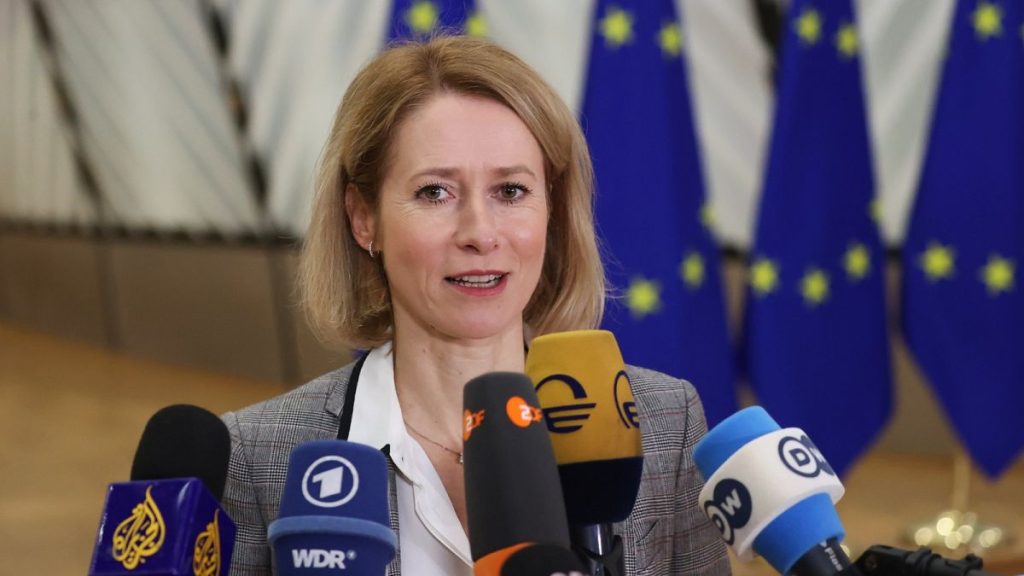The European Union has embarked on a delicate diplomatic tightrope walk, initiating direct engagement with Hayat Tahrir al-Sham (HTS), the Syrian rebel group that orchestrated the overthrow of Bashar al-Assad’s regime, while simultaneously maintaining its official designation of HTS as a terrorist organization. This unprecedented move signals a potential shift in the EU’s approach to Syria, recognizing HTS’s newfound dominance in the country’s political landscape while acknowledging the complex and controversial nature of the group’s past. Kaja Kallas, a senior EU diplomat, has been tasked with leading this sensitive mission, engaging with the provisional government established by HTS in Damascus. The EU’s objective is to assess HTS’s capacity to govern a stable and inclusive Syria that respects the rights of all its diverse communities, a key precondition for any potential normalization of relations.
The EU’s cautious approach reflects the inherent challenges presented by HTS’s history. The group’s past affiliation with al-Qaeda led to its designation as a terrorist organization by the United Nations, a designation subsequently adopted by the EU and its member states. This designation complicates any formal diplomatic recognition and poses significant legal and political hurdles. The EU’s emphasis on “deeds, not words” underscores its insistence on tangible evidence of HTS’s commitment to democratic principles, human rights, and inclusivity before considering any revision of its terrorist designation. The coming weeks and months will be crucial in determining whether HTS can genuinely transition from a militant group to a responsible political actor.
Since its ascent to power, HTS has actively sought to portray itself as the driving force behind a new era in Syrian politics. The appointment of a caretaker prime minister, the promise of a transition to a free-market economy, and the leader’s public adoption of his legal name, Ahmed al-Sharaa, all point towards a calculated effort to project an image of moderation and pragmatism. These moves are designed to attract international investment and bolster the group’s legitimacy on the global stage. However, lingering concerns persist regarding HTS’s human rights record, including accusations of severe punishments meted out under a strict interpretation of Islamic law. These allegations cast a shadow over HTS’s claims of reform and raise serious doubts about its capacity to guarantee a pluralistic and tolerant society in post-Assad Syria.
Syria’s rich tapestry of ethnic and religious communities, including Sunni and Shia Muslims, Alawites, Christians, Druze, Kurds, and Palestinians, underscores the critical importance of inclusivity in any future government. A recent joint declaration signed by representatives from the EU, US, UK, UN, and Arab countries emphasized the need for respect for human rights, particularly for women and minorities, and reaffirmed support for Syria’s territorial integrity and sovereignty. This international consensus highlights the global community’s shared commitment to a peaceful and inclusive future for Syria, a future that cannot be achieved without addressing the complex challenges presented by HTS’s involvement.
The EU’s engagement with HTS mirrors similar approaches adopted by the US and UK, both of which have confirmed diplomatic contact with the group while maintaining the terrorist designation. This coordinated strategy reflects a pragmatic recognition of HTS’s influence on the ground and a desire to explore all available avenues to achieve a stable and inclusive Syria. The shared goal is to ensure a representative government, secure chemical weapons stockpiles, and prevent further violence. The precise nature of the EU diplomat’s mission, including whether direct meetings with al-Sharaa or the prime minister will take place, remains unclear.
Beyond the complexities of diplomatic engagement, the international community faces the challenge of reassessing the extensive sanctions imposed on the Assad regime. These sanctions, targeting weapons, oil, technology, and financial transactions, have had a crippling effect on the Syrian economy. The UN special envoy for Syria has stressed the urgent need to lift these sanctions to facilitate the country’s economic recovery and reconstruction. The future of Syria hinges on the ability of the international community to navigate these complex diplomatic and economic challenges, balancing the need to engage with HTS’s newfound influence with the imperative of upholding human rights and ensuring a truly inclusive and representative government for all Syrians. The path forward remains uncertain, but the EU’s cautious engagement with HTS marks a significant step in this ongoing and delicate process.














